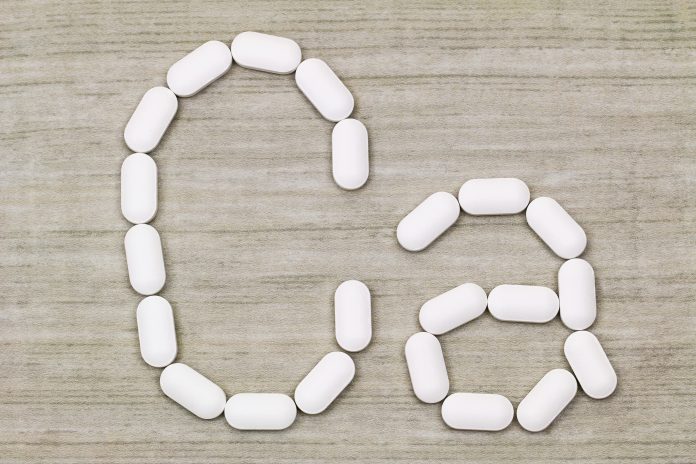Dr Deborah Lee, Dr Fox Online Pharmacy, explores the issue of calcium supplementation and shares her own personal experience after recently suffering her first osteoporotic fracture
- Are you going through menopause, or are you postmenopausal?
- Are you taking calcium supplements?
If so, you probably agree that it’s very difficult to find any good information about calcium supplements for menopausal women.
I’m 58, I’ve been on HRT and calcium supplements for 7 years, but despite this, I’ve just had my first osteoporotic fracture – my left wrist. I started looking into the whole issue of calcium supplementation. In this post, I share my findings.
Why may women need calcium supplements at and after menopause?
As women pass through the menopausal transition, usually around the age of 50-55 years, they lose a shocking 10% of their bone. However, for 1 in 4 women, it’s even worse. They are ‘fast bone losers’ and lose even greater amounts of bone – up to 20%. After around 5 years, as the postmenopausal period becomes established, this dramatic bone loss slows, but bone continues to be lost at a slower rate.
Bone loss occurs at menopause because bone metabolism is under the control of estrogen. At menopause, estrogen levels plummet. Bone is a living tissue, and every day, new bone cells are being produced, and old bone cells are being cleared away or resorbed. When estrogen levels fall, there is a reduction in the production of new bone cells, and an increase in bone resorption. Because of this, bones become less dense, generally weaker, and more susceptible to fracture.
Calcium and bone – Calcium is a mineral which is essential for bone formation. We obtain calcium from our diet and it is absorbed from the gut into the blood circulation. However, to absorb calcium, we also require adequate levels of vitamin D. If blood levels of calcium fall, we produce parathyroid hormone, which increases the resorption of bone, freeing-up calcium from the skeleton and putting this back in the circulation, to keep the blood level of calcium within normal limits.
Calcium levels may be lower than they should be for various reasons. This is commonly because our diet is lacking in calcium, and/or because our vitamin D levels are too low. Vitamin D is essential for us to be able to absorb calcium from the gut. Low levels of vitamin D are very common, all across the world. To make matters worse, as we age, absorption of calcium from the gut naturally declines, as part of the ageing process.
Bone health – There are many genetic, environmental and lifestyle factors which affect bone health. Looking after your bones at menopause means addressing all these factors. However, you cannot make healthy bone without sufficient levels of calcium. Adding back estrogen – in HRT – also has major benefits for bone health, and in fact, for the best results, as menopausal women, we need both.
One of the main problems is that while we are losing bone throughout our 50’s, we have no bone-related symptoms, and have no idea this is happening – that is – until we have a fracture. Once this has happened, it is impossible to make huge improvements to our bone mineral density. The sad truth is this is likely to continue to get worse.
The first osteoporotic fracture – If you have had a fracture in your 50‘s at a major site such as hip, vertebra, wrist, or shoulder, this means you should see your doctor and be assessed for osteoporosis. This will involve looking at lifestyle factors, having blood tests, and a Dual X-Ray Absorptiometry (DXA) scan, to measure your bone mineral density.
To assess your probability of having a further major fracture, this can be estimated by using the FRAX tool – a specially formulated calculation which combines your personal risk factors and bone mineral density to give you a percentage likelihood of major fragility fracture within the next 10-years.
This is where calcium comes in. Whatever investigations are carried out and whichever treatment you choose, calcium supplements are likely to be suggested. 43% of the adult population take calcium supplements, as do 70% of postmenopausal women.
What are the current recommendations for calcium supplements in menopausal women?
Women aged over 50 are currently recommended to ingest calcium 1200mg/day from all sources, along with 800 -1,000 IU of vitamin D (National Osteoporosis Society 2020).
Diet and calcium – You can work out from your diet whether you are taking in this much calcium every day, by looking at the calcium content of food and drink. It’s always preferable to get enough calcium naturally through your diet if you can. Your body is designed to absorb natural vitamins and minerals and will not absorb so well from any alternative source.
However, for many women, ingesting this much calcium in the diet isn’t possible. For example, there are 50 mg calcium in one orange. To have 1200 mg calcium per day means eating 24 oranges! Very often, women resort to taking a calcium supplement.
Calcium supplements – Nutritional surveys confirm that dietary intake of calcium is frequently far less than it should be. Doctors start with an assumption most adults have a dietary intake of calcium of only around 300 mg/day.
Bone loss and fracture risk increase in menopausal and postmenopausal women, when dietary intake of calcium is less than 700-800 mg/day.
If you start taking calcium supplements, it’s still important to have plenty of calcium in your diet. Supplements are just that – you take them in addition, and not as an alternative.
Are calcium supplements effective?
Although many research studies have shown that taking calcium supplements does slow bone loss and can reduce fractures, some recent research now suggests they may not as effective as once thought. Here are a few relevant studies –
- A 2015 meta-analysis of 59 randomised controlled trials concluded that both increasing dietary calcium, and taking calcium supplements, resulted in small increases in bone mineral density (BMD).
- Increasing dietary calcium increased BMD by 0.6-1% at the hip and total body at 1 year, and by 0.7-1.8% at both these sites plus at the hip and vertebral spine at 2 years.
- Calcium supplements increased BMD by 0.7-1.8% at all 4 of these sites, but also at the forearm, by 1 year, then at 2, and 2.5 years.
The results from taking increased calcium in the diet, and from taking calcium supplements, were felt to be broadly similar.
- In 2014, the US Preventative Task Force published a meta-analysis of 16 randomised controlled trials, of postmenopausal women taking calcium 1000 mg/day plus vitamin D, and concluded taking these supplements reduced fracture risk by 12%.
- A 2007 meta-analysis of 29 randomised controlled trials, including 63,897 postmenopausal women, looking at calcium and vitamin D for bone loss and fracture prevention had very positive findings. The authors concluded a significant, 12% reduction in the risk of fractures, plus a significantly reduced annual rate of bone loss of 0.54% at the hip, and 1.19% at the spine. In studies where women had over 80% compliance with treatment, fracture risk was reduced by even further – by 24%. Best effects were seen with calcium at doses of 1000-1200 mg/day and vitamin D of 800IU or higher.
- In 2015, the British Medical Journal (BMJ) published a large, systematic review of the evidence to support increasing calcium intake through diet or calcium supplements to prevent fractures. Overall, the authors concluded calcium supplements were ineffective at reducing fractures. However, they did report an 11% reduction in all fracture risk and an 11% reduction in vertebral fractures from calcium supplements. Their view, however, was that these findings were not meaningful, largely because they felt many of the clinical trials, they studied, were biased towards finding a favourable outcome. Bias means the investigators were influenced in some way to favour the product being studied. However, they also commented that study participants often had poor compliance with treatment and noted a 40-60% drop out rate from studies. They also drew attention to the fact that small numbers of women experience gastrointestinal side effects from calcium or may develop kidney stones.
Where does this leave those of us, at and after menopause, with thinning bones?
Research is always open to criticism. It may be that studies which have shown no benefit from calcium supplements, did so because of other reasons. How was compliance with calcium and vitamin D assessed? Were participants taking this correctly – with meals, split doses, not missing tablets etc …? What was their vitamin D status before they started? Did they all take additional vitamin D – how much? Study participants may also have had other contributory factors such as low phosphate levels, or a low dietary intake of protein. It is frustrating when research does not seem to answer the questions for which we need the answers.
Calcium supplements are still currently recommended for menopausal women –
- The European Menopause Society guidelines 2018 state that an adequate intake of calcium is the mainstay of the prevention of osteoporosis. However, women should be advised that there is no benefit of taking calcium above recommended levels.
- In a 2017 statement from the European Society for Clinical and Economic Aspects of Osteoporosis, Osteoarthritis and Musculoskeletal Diseases (ESCEO) and the International Foundation for Osteoporosis (IOF) recommend that “on the basis of the current evidence, that calcium supplementation, with concomitant vitamin D supplementation, is supported for patients at high risk of calcium and vitamin D insufficiency, and in those who are receiving treatment for osteoporosis.”
Can calcium supplements cause harm?
In people of all ages, including menopausal women, most experts believe the use of calcium is favourable and is generally safe. However, there are concerns about the following –
-
Cardiovascular disease
Research has produced conflicting results about whether calcium supplements increase or decrease cardiovascular risk. If there is any hamrful effect, it seems to be small. As an example, the 2006 Women’s Health Initiative (WHI) trial, which included data from 36,000 women did not find any increase in cardiovascular disease or mortality in women who took calcium and vitamin D supplements.
It’s always important if you have cardiovascular disease, to discuss the use of calcium supplements with your doctor.
-
Kidney stones
Because calcium supplements result in an increase in calcium excretion in the urine, there is a possible increased risk of kidney stone formation. However, again research has produced mixed results, with some researchers reporting the opposite effect.
However, one 2006 study, involving 36,282 postmenopausal women between 50-70, on 1000 mg/day calcium supplements and followed up for 7 years, reported a 17% increase in kidney stones.
You can reduce your risk of kidney stones by staying well hydrated, avoiding sugary drinks, reducing oxalate in your diet, avoiding large doses of vitamin C and reducing your salt intake.
If you have had kidney stones always discuss taking calcium supplements with your doctor before you start.
-
Gastrointestinal symptoms
Data from randomized controlled trials have shown that women on calcium supplements are more likely to complain of gastrointestinal side effects than those on placebo. In one 2011 meta-analysis of 7 RCT’s, 10% of women on placebo reported gastric side effects, compared to 14% on calcium supplements. The most common symptoms were indigestion, abdominal pain, and constipation. Rarely, these have resulted in hospital admission.
If you have gastrointestinal disease or are prone to GI symptoms, always get advice from your doctor before you start calcium supplements. Because GI diseases often result in poor absorption of nutrients from the gut, you may be at even greater risk of calcium deficiency.
What types of calcium supplements are there?
Calcium supplements for bone protection are available as –
- Calcium carbonate – most frequently used
- Calcium citrate – also used but less common
- Calcium gluconate – rarely used, contains less calcium
- Calcium lactate – rarely used, contains less calcium
- Bone meal, oyster shells – mostly calcium carbonate
- Marine algae – raw calcium – may contain heavy metals, including lead
How should I take calcium supplements?
- Always take your calcium supplements regularly and reliably. Do not run out of tablets or miss out doses.
- Calcium is absorbed in the small intestine. In general, calcium absorption is poor and is highly dependent on levels of vitamin D.
- Calcium carbonate contains 40% of elemental (pure) calcium, whereas calcium citrate contains 21%.
- However, calcium absorption is 24% higher from calcium citrate, than from calcium carbonate.
- Calcium carbonate should be taken with food, but calcium citrate can be taken on a full or empty stomach.
- Foods containing oxalates can inhibit the absorption of calcium carbonate. These include – spinach, rhubarb, baked potatoes, sweet potatoes, bran cereals, French fries, almonds, and cashew nuts.
- Foods containing phytates have the same effect. These include peas and pinto beans.
- Avoid taking calcium with high salt foods, as these increase calcium excretion in the urine, and can increase the risk of kidney stones.
What is the recommended dose of calcium?
- The recommended dose of calcium in women aged 50 – 70 years is 1200mg/day. Calcium should be taken at a 500-600 mg dose, as the gut cannot absorb any more than this at any one time. Each dose should be taken morning and evening. This ensures there is enough calcium to help prevent bone resorption over a full 24-hour period. Calcium should be given with vitamin D, as if vitamin D levels are too low, this prevents calcium being absorbed from the gut.
Do not be tempted to take too much vitamin D. Stay to your recommended dose. Although rare, it is possible for calcium levels to become too high (hypercalcemia) and this is potentially dangerous. Signs of calcium toxicity are nausea, vomiting, headache, thirst, weakness, and constipation.
What is the recommended dose of vitamin D?
- Vitamin D should be given with calcium at a dose of at least 800 IU/day. An adequate blood level of vitamin D is between 30 – 70 nmol/L.
In one 2012 study, when vitamin D 800 IU, along with 1200 -1400 mg calcium per day, was given to a group of postmenopausal women, after 12-months, 97.5% had blood levels of vitamin D over 50 nmol/L.
However, higher levels of vitamin D may be needed in postmenopausal women. The safe upper limit in adults in 4000 IU/day.
What’s best – a tablet, capsule, or liquid?
Calcium supplements are available as tablets, chewable tablets, dispersible tablets, capsules, liquids, and powders. No one formulation is ’better’ than any other, it’s all down to personal preference. However, do follow the instructions carefully. Only take the recommended amount. If it’s a chewable tablet, chew it thoroughly. If you are measuring it out on a spoon, do it carefully. If it is a slow-release calcium tablet do not crush or break the tablet.
Are there any special considerations for taking vitamin D?
There are no absolute contraindications to taking calcium, however, care is needed in patients with chronic kidney disease or kidney stones.
Are there any drug interactions?
- Calcium can reduce the absorption of other drugs such as bisphosphonates, tetracyclines, fluoroquinolones, levothyroxine, and levodopa.
- Thiazide diuretics can increase calcium absorption and increase the risk of hypercalcaemia (high blood calcium levels).
- If you take proton pump inhibitors such as omeprazole, this can inhibit the absorption of calcium.
- Aluminium and magnesium as in antacids, increase the amount of calcium excreted in the urine.
If you take any of these drugs leave at least 4 hours after taking calcium before taking your other medication.
What are the side effects?
Calcium and vitamin rarely cause side effects. Calcium can cause constipation so if you are prone to this, consider taking it with a laxative. Gastric side effects can occasionally be a problem, but if so, reduce the dose and build this up gradually, over a period of months.
Do I need monitoring on calcium supplements?
If you have had an osteoporotic fracture and are being assessed and treated for osteoporosis, you should have a medical review. It can be easy to just get your calcium and vitamin D as a repeat prescription, however, see your GP or your pharmacist for a medication review perhaps once a year or 18 months, or if there has been a change in your health.
Any other advice?
Calcium is just one part of your bone health. You do need to consider these other lifestyle factors as well. Women with poor bone health should be advised to stop smoking, reduce their caffeine intake to 1-2 caffeinated drinks per day, limit alcohol to 7 units per week, and do regular weight-bearing exercise, such as brisk walking 30-40 minutes per day. Also, think about anything you can put in place to reduce falls.
Calcium from algae
There has been increasing interest in a plant-based calcium supplement derived from marine algae – called AlgaeCal. This is promoted as a healthy, natural source of calcium, especially as the product contains other minerals essential for bone health such as magnesium, manganese, selenium, strontium, phosphorus, and zinc.
The improvements in bone density from AlgaeCal seem impressive. However, it also contains small quantities of heavy metals including arsenic, mercury, and lead. Although the company take the view that the levels of lead are low and unlikely to be dangerous for health, the situation remains unclear. More detailed, and long term safety data are needed.
Can you be allergic to calcium supplements?
Anyone can be allergic to anything. However, acute allergy to calcium supplements is very rare. In each calcium supplement, there will be other ingredients, such as caking agents, and preservatives. For example, you can read the list of ingredients of the calcium carbonate supplement Adcal, here.
If you have any signs of an acute allergic reaction (anaphylaxis) after taking a calcium supplement, don’t delay and call 999.
HRT and osteoporosis
The most effective way to prevent fractures in menopausal women is by taking estrogen in hormone replacement therapy (HRT). A huge body of evidence supports the effectiveness of estrogen in maintenance of bone mineral density and in reducing osteoporotic fractures. HRT reduces vertebral and non-vertebral fractures by 30%.
The British Menopause Society states that estrogen as hormone replacement therapy is still the treatment of choice for the prevention of osteoporosis. Despite the recent controversies about HRT, use of HRT is recommended in women between the ages of 50 and 60 years, or for 10 years after the onset of menopausal symptoms, for osteoporosis prevention and treatment.
For best results, calcium and vitamin D are advised in conjunction with HRT.
After this time, the risks of HRT should be carefully considered, and other treatment options are available if HRT is discontinued. In truth, there is no upper age for taking HRT and some women choose to stay on it well into their old age.
If you are concerned about your bone health, and haven’t thought until now about HRT, do go and discuss this with your GP.
Where to obtain calcium supplements
You can obtain calcium and vitamin D supplements on prescription from your GP.
If you purchase calcium and vitamin D supplements over the internet, always buy from a trusted source.
The website should be registered with the Medicine’s and Health Regulatory Authority (MHRA). Look for the logo –
The website should also have accreditation, for example, belong to the Health Food Manufacturer’s Association (HFMA). Look for the logo –
Final thoughts
So here I am at 58 with crumbling bones and somehow needing to decide what to do. I’m sure I’m not alone and many of you reading this are in the same boat.
It seems to me that to build a house, you need bricks. To build bones you need calcium and vitamin D. So, whatever the controversies, I am going to continue to take it. However, having discovered al the information in this article, I am going to take a different type of calcium, at a higher dose, and a higher dose of vitamin D, plus I will take it as perfectly as I can.
I have been on HRT for 7 years and plan to continue with this as I feel well on it and want all the benefits, especially any help it can give me for my bones! However, as I approach 60, there are other osteoporosis medications which I will now be discussing at my next osteoporosis consultation.
Each person will be in a different situation and come to their own conclusion. But I hope I have helped clarify some of the points about when, why, and how to take calcium supplements at menopause.
For more information
- Women’s Health Concern – Osteoporosis: bone health following menopause
- Food and Nutrition Research (2014) – Calcium and vitamin D – The state of the art for daily practice
- Maturitas (2018) – European Menopause and Andropause Society (EMAS) – Calcium in the prevention of postmenopausal osteoporosis: EMAS clinical guide














What about taking Calcium hydroxyapatite? What dose?